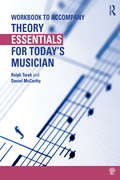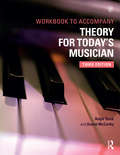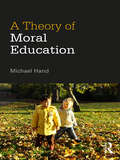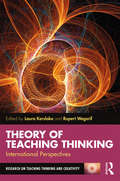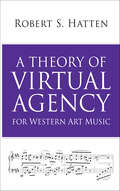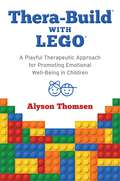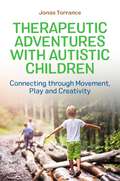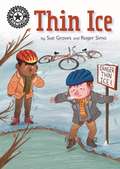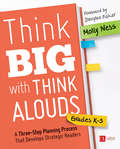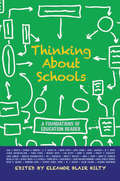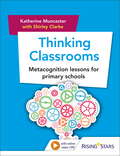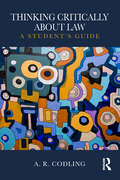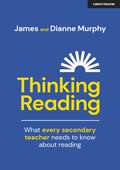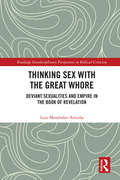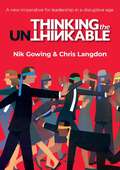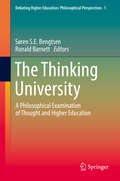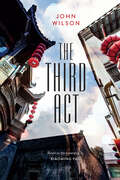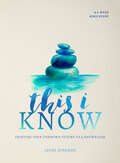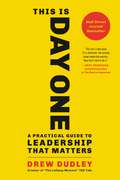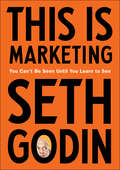- Table View
- List View
Theory Essentials for Today's Musician (Workbook): Workbook
by Ralph Turek Daniel McCarthyTheory Essentials for Today’s Musician offers a review of music theory that speaks directly and engagingly to modern students. Rooted in the tested pedagogy of Theory for Today’s Musician, the authors have distilled and reorganized the concepts from the thirty-three chapters of their original textbook into twenty-one succinct, modular chapters that move from the core elements of harmony to further topics in form and 20th-century music. A broad coverage of topics and musicals styles—including examples drawn from popular music—is organized into four key parts: Basic Tools Chromatic Harmony Form and Analysis The 20th Century and Beyond Theory Essentials features clear and jargon-free (yet rigorous) explanations appropriate for students at all levels, ensuring comprehension of concepts that are often confusing or obscure. An accompanying workbook provides corresponding exercises, while a companion website presents streaming audio examples. This concise and reorganized all-in-one package—which can be covered in a single semester for a graduate review, or serve as the backbone for a briefer undergraduate survey—provides a comprehensive, flexible foundation in the vital concepts needed to analyze music. PURCHASING OPTIONS Textbook and Workbook Package (Paperback): 9781138098756 Textbook Only (Hardback): 9781138708815 Textbook Only (Paperback): 9781138708822 Textbook Only (eBook): 9781315201122 Workbook Only (Paperback): 9781138098749 Workbook Only (eBook): 9781315103839
Theory for Today's Musician Workbook, Third Edition
by Ralph Turek Daniel McCarthyTheory for Today’s Musician, Third Edition, recasts the scope of the traditional music theory course to meet the demands of the professional music world, in a style that speaks directly and engagingly to today’s music student. It uses classical, folk, popular, and jazz repertoires with clear explanations that link music theory to musical applications. The authors help prepare students by not only exploring how music theory works in art music, but how it functions within modern music, and why this knowledge will help them become better composers, music teachers, performers, and recording engineers. This broadly comprehensive text merges traditional topics such as part writing and harmony (diatonic, chromatic, neo-tonal and atonal), with less traditional topics such as counterpoint and musical process, and includes the non-traditional topics of popular music songwriting, jazz harmony and the blues. The accompanying companion website provides interactive exercises that allow students to practice foundational theory skills. Written by experienced authors, both active classroom teachers for many years, Theory for Today’s Musician is the complete and ideal theory text to enable today’s student to accomplish their musical goals tomorrow. Updated and corrected throughout, the Third Edition includes: Expanded coverage of atonality and serialism, now separated into two chapters. Broadened treatment of cadences, including examples from popular music. Substantially rewritten chapter on songwriting. Interactive features of the text simplified to two types, "Concept Checks" and "Review and Reinforcement," for greater ease of use. New and updated musical examples added throughout. Charts, illustrations, and musical examples revised for increased clarity. Audio of musical examples now provided through the companion website. The accompanying Workbook offers exercises and assignments to accompany each chapter in the book. A companion website houses online tutorials with drills of basic concepts, as well as audio.
A Theory of Moral Education
by Michael HandChildren must be taught morality. They must be taught to recognise the authority of moral standards and to understand what makes them authoritative. But there’s a problem: the content and justification of morality are matters of reasonable disagreement among reasonable people. This makes it hard to see how educators can secure children’s commitment to moral standards without indoctrinating them. In A Theory of Moral Education, Michael Hand tackles this problem head on. He sets out to show that moral education can and should be fully rational. It is true that many moral standards and justificatory theories are controversial, and educators have an obligation to teach these nondirectively, with the aim of enabling children to form their own considered views. But reasonable moral disagreement does not go all the way down: some basic moral standards are robustly justified, and these should be taught directively, with the aim of bringing children to recognise and understand their authority. This is an original and important contribution to the philosophy of moral education, which lays a new theoretical foundation for the urgent practical task of teaching right from wrong.
Theory of Teaching Thinking: International Perspectives (Research on Teaching Thinking and Creativity)
by Laura Kerslake Rupert WegerifAcross the world education for 'thinking’ is seen as the key to thriving in an increasingly complex, globalised, technological world. The OECD suggests that teaching thinking is key to growing a more successful economy; others claim it is needed for increased democratic engagement and well-being. Theory of Teaching Thinking discusses what is meant by ‘thinking’ in the context of teaching and takes a global perspective incorporating contributions from neurocognitive, technological, Confucian, philosophical, and dialogical viewpoints. Questions explored throughout this edited volume include: what is thinking? how can thinking be taught? what does ‘better thinking’ mean, and how can we know it if we see it? what is the impact on wider society when thinking is taught in the classroom? Extensively researched and at the cutting edge of this field, this book provides the context for teaching thinking that researchers, teachers, and policy-makers need. As the first book in a brand new series, Research on Teaching Thinking and Creativity, it is a much-needed introduction and guide to this critical subject.
A Theory of Virtual Agency for Western Art Music (Musical Meaning and Interpretation)
by Robert S. HattenIn his third volume on musical expressive meaning, Robert S. Hatten examines virtual agency in music from the perspectives of movement, gesture, embodiment, topics, tropes, emotion, narrativity, and performance. Distinguished from the actual agency of composers and performers, whose intentional actions either create music as notated or manifest music as significant sound, virtual agency is inferred from the implied actions of those sounds, as they move and reveal tendencies within music-stylistic contexts. From our most basic attributions of sources for perceived energies in music, to the highest realm of our engagement with musical subjectivity, Hatten explains how virtual agents arose as distinct from actual ones, how unspecified actants can take on characteristics of (virtual) human agents, and how virtual agents assume various actorial roles. Along the way, Hatten demonstrates some of the musical means by which composers and performers from different historical eras have staged and projected various levels of virtual agency, engaging listeners imaginatively and interactively within the expressive realms of their virtual and fictional musical worlds.
Thera-Build® with LEGO®: A Playful Therapeutic Approach for Promoting Emotional Well-Being in Children
by Alyson Thomsen'Thera-Build' is a LEGO®-based therapeutic approach for improving children's emotional well-being. Participation in Thera-Build groups can help to boost self-esteem, address common issues such as anxiety and anger, support social development and build positive attachments. This inspiring and user-friendly guide explores the power of play, introduces the basics of brain plasticity and attachment theory, and shows exactly how to set up and run an effective Thera-Build group. A wide range of imaginative games and activities is included.
Therapeutic Adventures with Autistic Children: Connecting through Movement, Play and Creativity
by Jonas TorranceA vivid exploration of working with autistic children using empowering techniques from a range of creative therapies. Each chapter in this heartening book is the story of a child with autism and how therapy was pivotal in confronting his or her individual dilemma. Covering many of the behaviours characteristic to autism, such as uncontrolled anger and obsessive tendencies, the therapies used range from drawing and dancing to meditation and martial arts, depending on the needs and interests of each child. The key message is that investing in the relationship between the therapist and the child - so that they grow, play and develop together - is transformative.
Thin Ice: Independent Reading 11 (Reading Champion #300)
by Sue GravesWhen friends Lenny and Ted take their bikes off to the woods on a cold, snowy day, Mum warns them to keep away from the icy pond. The trouble is, Lenny just can't resist it and ends up nearly paying a very high price...Reading Champion offers independent reading books for children to practise and reinforce their developing reading skills.Fantastic, original stories are accompanied by engaging artwork and a reading activity. Each book has been carefully graded so that it can be matched to a child's reading ability, encouraging reading for pleasure.The Key Stage 2 Reading Champion Books are suggested for use as follows:Independent Reading 11: start of Year 3 or age 7+Independent Reading 12: end of Year 3 or age 7+Independent Reading 13: start of Year 4 or age 8+Independent Reading 14: end of Year 4 or age 8+Independent Reading 15: start of Year 5 or age 9+Independent Reading 16: end of Year 5 or age 9+Independent Reading 17: start of Year 6 or age 10+Independent Reading 18: end of Year 6 or age 10+
Think Big With Think Alouds, Grades K-5: A Three-Step Planning Process That Develops Strategic Readers (Corwin Literacy)
by Molly K. NessA think-aloud process that comes close to bottling magic Grab a pencil, and you are on your way to dynamic lessons using Molly’s three-step planning process. Read Once: Go wild, putting a flurry of sticky notes on spots that strike you Read Twice: Whittle your notes down to the juiciest stopping points Read Three Times: Jot down what you will say so there’s no need to wing it in front of the kids Molly helps you focus on just five strategies: asking questions, making inferences, synthesizing, understanding the author’s purpose, and monitoring and clarifying. Includes more than 20 ready-made think aloud scripts, activities, templates, and more.
Think Big With Think Alouds, Grades K-5: A Three-Step Planning Process That Develops Strategic Readers (Corwin Literacy)
by Molly K. NessA think-aloud process that comes close to bottling magic Grab a pencil, and you are on your way to dynamic lessons using Molly’s three-step planning process. Read Once: Go wild, putting a flurry of sticky notes on spots that strike you Read Twice: Whittle your notes down to the juiciest stopping points Read Three Times: Jot down what you will say so there’s no need to wing it in front of the kids Molly helps you focus on just five strategies: asking questions, making inferences, synthesizing, understanding the author’s purpose, and monitoring and clarifying. Includes more than 20 ready-made think aloud scripts, activities, templates, and more.
Thinking about Schools: A Foundations of Education Reader
by Eleanor Blair HiltyDesigned specifically for students with little or no education background, Thinking About Schools is an essential collection of classic and contemporary readings that provides a complete, balanced overview of educational foundations. Anchored in classic scholarship from the 1960s to today, this book also incorporates a number of thought-provoking popular essays that will engage students and encourage critical thinking about vital issues concerning the purpose of education, curriculum content, the roles and responsibilities of students and teachers, and new directions for education in the twenty-first century. In addition to selecting each reading for its impact and accessibility, editor Eleanor Blair Hilty further promotes student comprehension by including introductions, discussion questions, guides to further reading, and related resources for each of the five parts.
Thinking Classrooms: Metacognition Lessons For Primary Schools
by Shirley Clarke Katherine MuncasterTeaching children metacognitive skills (an understanding of how they learn) can help raise attainment by an average of seven months according to research carried out by the Education Endowment Fund. Rising Stars' Thinking Classrooms handbook offers engaging lesson plans and activities to introduce and teach metacognition throughout a primary school, from Reception through KS1 and KS2.With Rising Stars' Thinking Classrooms you can encourage transferrable learning skills such as planning and checking, boost children's independence, resilience and approach to learning, and develop teacher confidence with embedded CPD. This comprehensive handbook also includes a clear introduction to metacognition and its benefits, pupil self-evaluation at the end of each activity, downloadable worksheets and templates, original and fun assembly ideas and fun assembly ideas and accompanying videos.
Thinking Classrooms: Metacognition Lessons for Primary Schools
by Katherine Muncaster Shirley ClarkeTeaching children metacognitive skills (an understanding of how they learn) can help raise attainment by an average of seven months according to research carried out by the Education Endowment Fund. Rising Stars' Thinking Classrooms handbook offers engaging lesson plans and activities to introduce and teach metacognition throughout a primary school, from Reception through KS1 and KS2.With Rising Stars' Thinking Classrooms you can encourage transferrable learning skills such as planning and checking, boost children's independence, resilience and approach to learning, and develop teacher confidence with embedded CPD. This comprehensive handbook also includes a clear introduction to metacognition and its benefits, pupil self-evaluation at the end of each activity, downloadable worksheets and templates, original and fun assembly ideas and fun assembly ideas and accompanying videos.
Thinking Critically About Law: A Student's Guide
by A. R. CodlingSo you’ve arrived at university, you’ve read the course handbook and you’re ready to learn the law. But is knowing the law enough to get you the very best marks? And what do your lecturers mean when they say you need to develop critical and analytical skills? When is it right to put your own views forward? What are examiners looking for when they give feedback to say that your work is too descriptive? This book explores what it means to think critically and offers practical tips and advice for students to develop the process, skill and ability of thinking critically while studying law. The book investigates the big questions such as: What is law? and What is ‘thinking critically’? How can I use critical thinking to get better grades in assessments? What is the role of critical thinking in the work place? These questions and more are explored in Thinking Critically About Law. Whether you have limited prior experience of critical thinking or are looking to improve your performance in assessments, this book is the ideal tool to help you enhance your capacity to question, challenge, reflect and problematize what you learn about the law throughout your studies and beyond.
Thinking Reading: What every secondary teacher needs to know about reading
by Dianne Murphy James MurphyDespite the efforts of teachers and educators, every year secondary schools across the English-speaking world turn out millions of functionally illiterate leavers. The costs in human misery and in wasted productivity are catastrophic. What can schools do to prevent this situation? In this highly accessible book James and Dianne Murphy combine more than 50 years of experience to provide teachers with a thorough, easy to use introduction to the extensive research on reading and its effects on student achievement. Drawing on the work of experts from around the world, the authors explore how we learn to read, how the many myths and misconceptions around reading developed, and why they continue to persist.Building on these foundations chapters go on to examine how the general secondary school classroom can support all levels of reading more effectively, regardless of subject; how school leaders can ensure that their systems, practices and school culture deliver the very best literacy provision for all students; and what it takes to ensure that a racing intervention aimed at adolescent struggling readers is truly effective. The overall message of this books is one of great optimism: the authors demonstrate that the right of every child to learn to read is entirely achievable if schools employ the best research-driven practice.
Thinking Reading: What every secondary teacher needs to know about reading
by Dianne Murphy James MurphyDespite the efforts of teachers and educators, every year secondary schools across the English-speaking world turn out millions of functionally illiterate leavers. The costs in human misery and in wasted productivity are catastrophic. What can schools do to prevent this situation? In this highly accessible book James and Dianne Murphy combine more than 50 years of experience to provide teachers with a thorough, easy to use introduction to the extensive research on reading and its effects on student achievement. Drawing on the work of experts from around the world, the authors explore how we learn to read, how the many myths and misconceptions around reading developed, and why they continue to persist.Building on these foundations chapters go on to examine how the general secondary school classroom can support all levels of reading more effectively, regardless of subject; how school leaders can ensure that their systems, practices and school culture deliver the very best literacy provision for all students; and what it takes to ensure that a racing intervention aimed at adolescent struggling readers is truly effective. The overall message of this books is one of great optimism: the authors demonstrate that the right of every child to learn to read is entirely achievable if schools employ the best research-driven practice.
Thinking Sex with the Great Whore: Deviant Sexualities and Empire in the Book of Revelation (Routledge Interdisciplinary Perspectives on Biblical Criticism)
by Luis Menéndez-AntuñaMany scholars in Biblical and Revelation studies have written at length about the imperial and patriarchal implications of the figure of the Whore of Babylon. However, much of the focus has been on the links to the Roman Empire and ancient attitudes towards gender. This book adds another layer to the conversation around this evocative figure by pursuing an ideological critique of the Great Whore that takes into account contemporary understandings of sexuality, and in so doing advances a de-moralization of apparent sexual deviancy both in the present and in the past. Offering an emancipatory reading of Revelation 17-18 using Foucauldian, postcolonial and queer historiographies, this study sets out alternative paths for identity construction in Biblical texts. By using these alternative critical lenses, the author argues that the common neglect of the ethical and political impact of Biblical texts in the present can be overcome. This, in turn, allows for fresh reflection on the study of the Bible and its implications for progressive politics. Situated at the intersection of Revelation Studies, Biblical Studies and Hermeneutics, as well as Contextual/Liberationist Theologies and Queer and Postcolonial Criticism, this is a cutting edge study that will be of keen interest to scholars of Theology and Religious Studies.
Thinking the Unthinkable: A new imperative for leadership in the digital age
by Chris Langdon Nik GowingExecutive leadership faces new vulnerabilities. Many leaders privately concede them, but few are willing to talk publicly about them. "Unthinkable" events since 2014 have revealed a new leadership fragility at the highest levels. And the pace of change in 2017 shows that the uncertainties are greater than ever. Is this the "new normal?"Thinking The Unthinkable is an investigation into why leaders have appeared more unable or unwilling than ever to anticipate the biggest issues of our time.In an era of "wicked problems" why are current leadership behaviours and culture apparently not fit for purpose? What are the causes of so many failures in policy and strategic forecasting? Are they human frailties? Or are they systemic failures to embrace smartly new realities?Through hundreds of interviews and conversations, Nik Gowling and Chris Langdon have analysed the deep new challenges to the human capacity of leaders at the highest keels to accept, understand, embrace then handle the extraordinary processes of change and disruption. This essential book draws on the candid responses. The findings are scary and disconcerting.
Thinking the Unthinkable: A new imperative for leadership in the digital age
by Chris Langdon Nik GowingExecutive leadership faces new vulnerabilities. Many leaders privately concede them, but few are willing to talk publicly about them. "Unthinkable" events since 2014 have revealed a new leadership fragility at the highest levels. And the pace of change in 2017 shows that the uncertainties are greater than ever. Is this the "new normal?"Thinking The Unthinkable is an investigation into why leaders have appeared more unable or unwilling than ever to anticipate the biggest issues of our time.In an era of "wicked problems" why are current leadership behaviours and culture apparently not fit for purpose? What are the causes of so many failures in policy and strategic forecasting? Are they human frailties? Or are they systemic failures to embrace smartly new realities?Through hundreds of interviews and conversations, Nik Gowling and Chris Langdon have analysed the deep new challenges to the human capacity of leaders at the highest keels to accept, understand, embrace then handle the extraordinary processes of change and disruption. This essential book draws on the candid responses. The findings are scary and disconcerting.
The Thinking University: The Selected Works Of Ronald Barnett
by Søren S.E. Bengtsen Ronald BarnettThis book reinvigorates the philosophical treatment of the nature, purpose, and meaning of thought in today’s universities. The wider discussion about higher education has moved from a philosophical discourse to a discourse on social welfare and service, economics, and political agendas. This book reconnects philosophy with the central academic concepts of thought, reason, and critique and their associated academic practices of thinking and reasoning. Thought in this context should not be considered as a merely mental or cognitive construction, still less a cloistered college, but a fully developed individual and social engagement of critical reflection and discussion with the current pressing disciplinary, political, and philosophical issues. The editors hold that the element of thought, and the ability to think in a deep and groundbreaking way is, still, the essence of the university. But what does it mean to think in the university today? And in what ways is thought related not only to the epistemological and ontological issues of philosophical debate, but also to the social and political dimensions of our globalised age? In many countries, the state is imposing limitations on universities, dismissing or threatening academics who speak out critically. With this volume, the editors ask questions such as: What is the value of thought? What is the university’s proper relationship to thought?To give the notion of thought a thorough philosophical treatment, the book is divided into in three parts. The focus moves from an epistemological perspective in Part I, to a focus on existence and values in higher education in Part II, and then to a societal-oriented focus on the university in Part III. All three parts, in their own ways, debate the notion of thought in higher education and the university as a thinking form of being.
The Third Act
by John Wilson Xiaoming YaoThe Third Act deals with the intercultural struggles faced by Chinese students studying in North America in the present day and by an American playwright, Neil Peterson, caught up in the Nanjing Massacre of 1937. The contemporary story focuses on three Chinese friends (Tone, Pike and Theresa) who grapple in their own ways with the pressure to succeed in an unfamiliar culture. The historical tale concerns Peterson's effort to find his literary voice and save the woman he loves amidst the chaos and horror of the fall of Nanjing in the Second Sino-Japanese War. The two stories are tied together by a play that Peterson attempted to write after his return to America. The students in the present day get caught up in putting on a performance of the missing third act of Peterson's play, and in doing so they are forced to confront their cultural and personal pasts and futures.
This I Know: Trusting Your Unknown Future to a Known God
by Laura DingmanHow to live like God's in controlDo you worry often about what the future holds? Do you long for peace but don&’t know how to have it? Do you know factually that God is trustworthy, but not practically how to live that out?This I Know is a 6-week Bible study for those who want to walk upon the water. It guides women into biblical truths about the character of God so they can step faithfully into the unknown, confident in the God they do know. Corrie Ten Boom said it best, &“Never be afraid to trust your unknown future to a known God.&” Join Laura Dingman as she journeys through Acts 17, James 1, Habakkuk 3, Psalm 46, 2 Chronicles 20, and Joshua 3, diving into subjects like abundance in Jesus, the goodness of God in trial, and the value of remembering God&’s past faithfulness. Each week offers opportunity for prayer, interaction with the biblical text, journaling, and group discussion. Using Scripture, insights from her own life, and prompts for reflection, Laura points readers continuously to the unchanging character of God, helping them surrender their lives to Him and give Him all their trust.
This I Know: Trusting Your Unknown Future to a Known God
by Laura DingmanHow to live like God's in controlDo you worry often about what the future holds? Do you long for peace but don&’t know how to have it? Do you know factually that God is trustworthy, but not practically how to live that out?This I Know is a 6-week Bible study for those who want to walk upon the water. It guides women into biblical truths about the character of God so they can step faithfully into the unknown, confident in the God they do know. Corrie Ten Boom said it best, &“Never be afraid to trust your unknown future to a known God.&” Join Laura Dingman as she journeys through Acts 17, James 1, Habakkuk 3, Psalm 46, 2 Chronicles 20, and Joshua 3, diving into subjects like abundance in Jesus, the goodness of God in trial, and the value of remembering God&’s past faithfulness. Each week offers opportunity for prayer, interaction with the biblical text, journaling, and group discussion. Using Scripture, insights from her own life, and prompts for reflection, Laura points readers continuously to the unchanging character of God, helping them surrender their lives to Him and give Him all their trust.
This Is Day One: A Practical Guide to Leadership That Matters
by Drew DudleyBased on his TEDx talk "Everyday Leadership (the Lollipop Moment)"--voted one of the 15 most inspirational TED talks of all time--This Is Day One is leadership expert Drew Dudley's guide to cultivating the behaviors that will help you to succeed and empower those around you. If you're intimidated by the mystique surrounding leadership, this book is for you. Dudley simplifies leadership without denying its complexity, demonstrating that leadership in all its forms begins at the same clear and accessible place for everyone: what he calls "Day One."Day One is when you discover, define, and start to consistently deliver on your foundational leadership values. Living that day over and over is what creates leaders, and Dudley provides the key tools necessary to craft and commit to your own personal Day One, including: A step-by-step process designed to surface your core leadership values and embed them into your daily behaviorA roadmap to behavioral changes proven to increase commitment, pride, productivity, and happiness Insights into key leadership values that drive performance and impactSharing the process that led him through battles with alcohol, obesity, and personal tragedy, Dudley shows you how to develop a relentless commitment to the daily behaviors that will make you a better executive, coach, or teacher, and how you can inspire others to do the same. Most of the leadership on the planet comes from people who don't see themselves as leaders. This Is Day One shows you how to start changing that. Through the insights of leaders of all types--CEOs, elite athletes, cab drivers, custodians, and everyone in between--Dudley helps you understand what your Day One needs to look like, reminds you why you're a leader, and makes clear what you can do about it--starting today, on Day One.
This Is Marketing: You Can't Be Seen Until You Learn to See
by Seth GodinA game-changing approach to marketing, sales, and advertising, by bestselling author and renowned business thinker Seth GodinSeth Godin has taught and inspired millions of entrepreneurs, marketers, leaders, and fans from all walks of life, via his blog, online courses, lectures, and bestselling books. He is the inventor of countless ideas and phrases that have made their way into mainstream business language, from Permission Marketing to Purple Cow to Tribes to The Dip. Now, for the first time, Godin offers the core of his marketing wisdom in one compact, accessible, and timeless package.This is Marketing shows you how to do work you're proud of, whether you're a tech startup founder, a small business owner, or an executive at a large corporation. Great marketers don't use consumers to solve their company's problem; they use marketing to solve other people's problems. Their tactics rely on empathy, connection, and emotional labor instead of attention-stealing ads and spammy email funnels. When done right, marketing seeks to make change in the world.No matter what your product or service, this book will teach you how to reframe how it's presented to the world, in order to meaningfully connect with the people who want it. Seth employs his signature blend of insight, observation, and memorable examples to teach you:* How to build trust and permission with your target market.* The art of positioning--deciding not only who it's for, but who it's not for.* Why the best way to achieve your marketing goals is to help others become who they want to be.* Why the old approaches to advertising and branding no longer work. * The surprising role of tension in any decision to buy (or not).* How marketing is at its core about the stories we tell ourselves about our social status.You can do work that matters for people who care. This book shows you the way.
